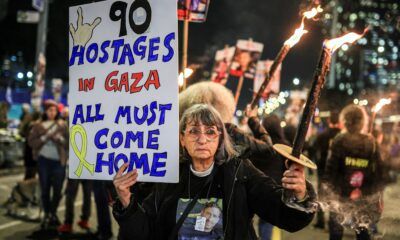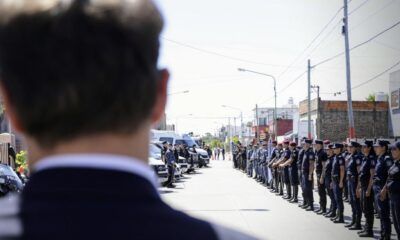INTERNACIONAL
Israeli military tells Palestinians not to return to north Gaza after witnesses say troops killed 5
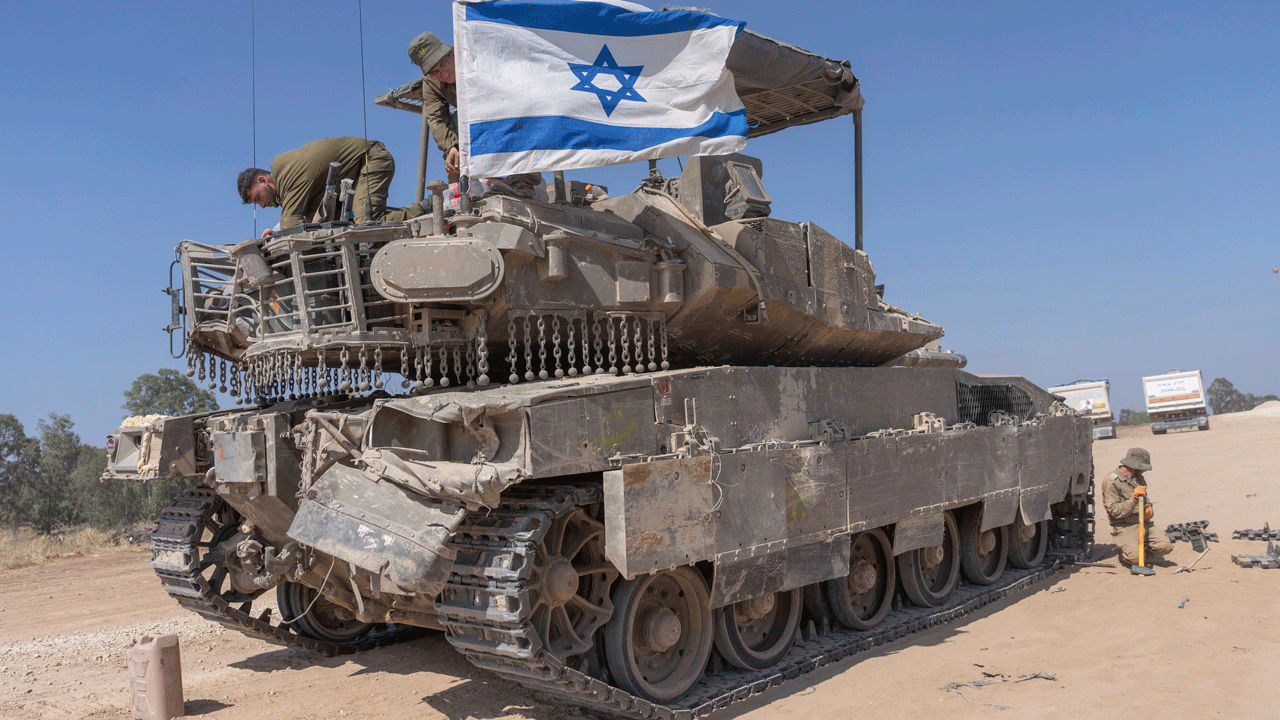
DEIR AL-BALAH, Gaza Strip (AP) — The Israeli military renewed warnings on Monday for Palestinians not to return to northern Gaza, a day after witnesses and medical officials said Israeli troops opened fire and killed five people among throngs of displaced residents trying to walk back to their homes in the devastated area.
Hundreds of thousands of Palestinians were driven from the north after Israeli forces first launched their offensive there soon after Hamas’ Oct. 7 attack on southern Israel. In the months of fighting since, vast parts of the north have been flattened, including much of Gaza City. After months of Israeli restrictions on aid to the north, some 300,000 who remained there are on the brink of famine, according to the United Nations.
ISRAEL DEFENSE MINISTER SAYS HAMAS HAS ‘CEASED TO FUNCTION AS A MILITARY ORGANIZATION’
Still, many Palestinians have wanted to go back, saying they are sick of the conditions they endured in displacement. For months, families have been crammed into tent camps, schools-turned-shelters and homes of relatives throughout the south of the Gaza Strip. Some also fear remaining in Rafah, Gaza’s southernmost town, as Israel says it plans to attack it eventually to root out Hamas.
Late Monday, Defense Minister Yoav Gallant met with top officials to work on preparations for the Rafah invasion, his office said. The international community, including the United States, have voice strong objections to the planned offensive, saying it will endanger the estimated 1.4 million Palestinians sheltered in Rafah.
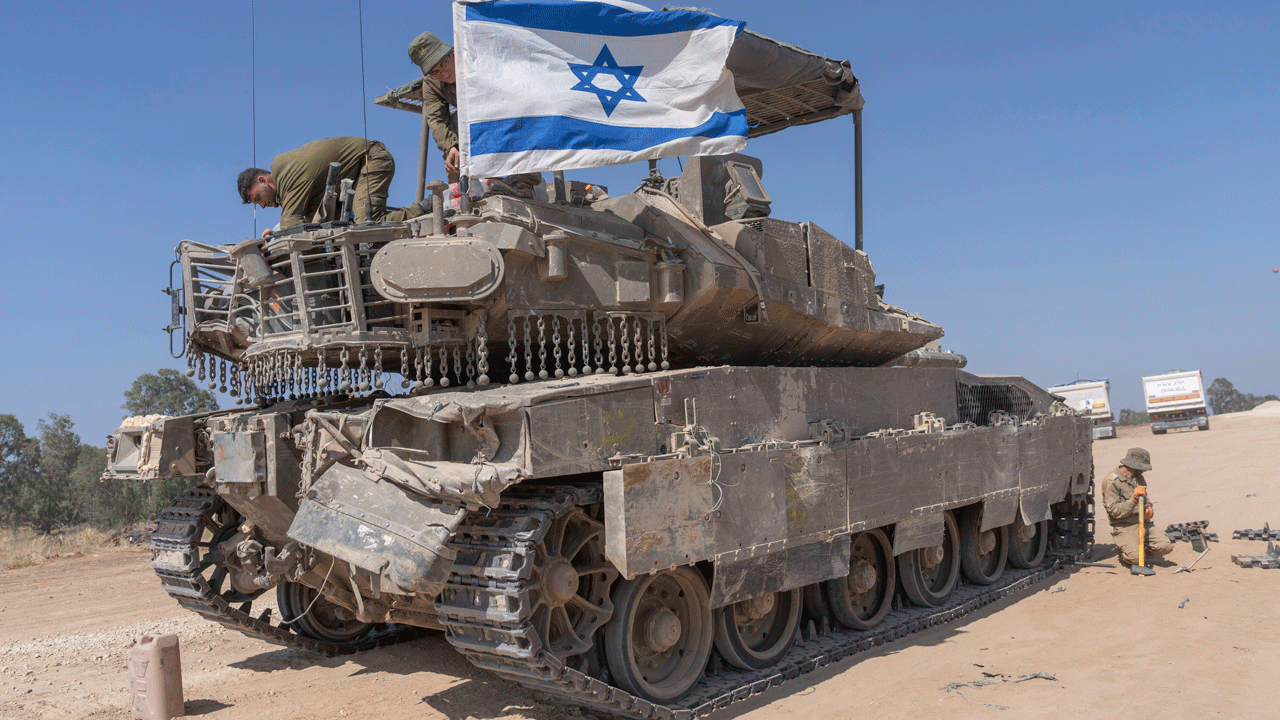
An Israeli soldier attaches an Israeli flag on top of an armored personnel carrier (APC) near Israel’s border with Gaza, in southern Israel, Monday, April 15, 2024. (AP Photo/Ohad Zwigenberg)
Gallant’s office said Monday’s meeting included plans for evacuating civilians and expanding deliveries of food and medical equipment to Gaza.
Israel, which has reduced the number of its troops across Gaza, has repeatedly rejected calls to let Palestinians back to the north of the territory, saying Hamas militants continue to operate there. The military says it has loosened the militants’ control over the north, but it is still carrying out airstrikes and raids against what it says are reorganizing militants. Last month, Israeli troops raided Gaza’s main hospital, Shifa, in two weeks of fighting that left the facility in ruins.
Israeli military spokesman Avichay Adraee wrote on X, formerly Twitter, that Palestinians should stay in southern Gaza because the north is a «dangerous combat zone.»
People appeared to be heeding the new warning, especially after Sunday’s shootings.
On Sunday, thousands of Palestinians tried going up Gaza’s coastal road back to the north, most on foot and some on the backs of donkey carts. Some said they had heard rumors that Israeli troops were allowing people to enter the north.
«We want our homes. We want our lives. We want to return, whether with a truce or without a truce,» said Um Nidhal Khatab, who was among those trying to return home.
Several witnesses said Israeli troops opened fire as the crowds neared checkpoints at Wadi Gaza, the line that the military has drawn separating northern Gaza from the rest of the territory. Five people were killed and 54 wounded, according to officials at nearby Awda Hospital in central Gaza, where the casualties were brought.
The Israeli military had no immediate comment. It was not clear what triggered the shooting.
Farida Al-Ghoul, 27, said that as she and her family neared the checkpoint, she saw a woman rushing back with blood on her telling them not to continue. Ignoring her, they kept going ahead, but soon there was heavy gunfire and shelling around them. She said she saw Israeli troops shooting.
She and another witness said the troops were letting some women and children through to go north but opened fire when some young men tried to pass.
«People on the side were falling down,» al-Ghoul said. «When we saw these scenes, we decided to turn back and never try again.»
Karam Abu Jasser said he, his wife and four children, were among the crowd and they heard gunshots and shelling from up ahead at the checkpoint. «People were panicked, especially women and children. There were many women and children. We ran away,» Abu Jasser said, speaking from a shelter in central Gaza.
He said his family wanted to return home to the Jabalia refugee camp in the north, even though they know their house was hit and damaged.
«We’ll have to live in a tent, but it will be at our home,» he said. «There is bombing everywhere in Gaza. If we will die, it’s better to die in our home.»
The return of the population to northern Gaza has been a key sticking point between Israel and Hamas in negotiations underway for a cease-fire deal that would bring the release of hostages taken by Hamas in the Oct. 7 attack.
Israel wants to try to delay the return to prevent militants from regrouping in the north, while Hamas says it wants a free flow of returnees, a full withdrawal of all Israeli troops from Gaza and an end to the war.
«The permanent ceasefire is the only guarantee to protect our people and stop the flow of blood and massacres,» Izzat al-Risheq, a top Hamas official, said in a statement.
The war has had a staggering toll on civilians in Gaza, with most of the territory’s 2.3 million people displaced by the fighting and living in dire circumstances, often in tents and with little food and no end in sight to their misery. Large swaths of the urban landscape have been damaged or destroyed, leaving many displaced Palestinians with nowhere to return to.
Six months of fighting in Gaza have pushed the tiny Palestinian territory into a humanitarian crisis, leaving more than 1 million people on the brink of starvation.
Famine is said to be imminent in the hard-hit north, where aid has struggled to reach because of the fighting. Israel has opened a new crossing for aid trucks into the north as it ramps up aid deliveries to the besieged enclave. However, the United Nations says the surge of aid is not being felt in Gaza because of persistent distribution difficulties.
The U.N. food agency on Monday said it managed to deliver fuel and wheat flour to a bakery in isolated Gaza City in the north for the first time since the war started.
The conflict started on Oct. 7, when Hamas killed 1,200 Israelis, mostly civilians, in a surprise attack and incursion into southern Israel. Around 250 people were seized as hostages by the militants and taken to Gaza. A deal in November freed about 100 hostages, leaving about 130 in captivity, although Israel says about a quarter of those are dead.
CLICK HERE TO GET THE FOX NEWS APP
Israeli bombardments and ground offensives in Gaza have killed more than 33,700 Palestinians and wounded over 76,200, the Gaza Health Ministry says. Women and children make up around two-thirds of the dead, according to the ministry, whose count doesn’t differentiate between civilians and combatants.
Israel says it has killed over 12,000 militants during the war, but it has not provided evidence to back up the claim.
INTERNACIONAL
‘Peace through strength’: Trump and Netanyahu expected to discuss Iran, Hamas at White House meeting

TEL AVIV – Israeli Prime Minister Benjamin Netanyahu’s meeting with President Donald Trump at the White House on Tuesday is geared toward bolstering ties with and securing guarantees from the Trump administration primarily over Iran and the war against Hamas, according to current and former Israeli officials.
«Prime Minister Netanyahu’s historic visit to Washington will mark a significant moment in Israel-U.S. relations, setting a tone of close cooperation and friendship between the Israeli government and the Trump administration,» Israeli Ambassador to the United States Yechiel Leiter told Fox News Digital.
«The prime minister will be the first foreign leader to visit the White House in President Trump’s second term, and his visit will spur bilateral efforts to promote security and prosperity in the U.S., Israel and the Middle East,» he added.
AMERICAN AMONG THREE HOSTAGES FREED FROM TERROR’S GRIP AFTER NEARLY 500 DAYS
Benjamin Netanyahu leaves Israel for a meeting with President Donald Trump in Washington, D.C., February 2025.
Leiter, appearing on «America’s Newsroom» last week, told Dana Perino that Iran would be front and center during the Trump-Netanyahu meeting. «We will make the point that to allow Tehran to maintain its nuclear capabilities, which they can raise very quickly toward nuclear weapons, is simply unacceptable,» he stated.
Netanyahu was last at the White House on July 25, 2024, with then-President Biden having only invited the Israeli leader some 20 months after his re-election. This was widely viewed as a snub by Biden, whose party has increasingly distanced itself from traditional bipartisan support for the Jewish state.
Netanyahu told reporters ahead of his departure that it was «telling» Trump chose to meet him first, describing it as «a testimony to the strength of the American-Israeli alliance.»
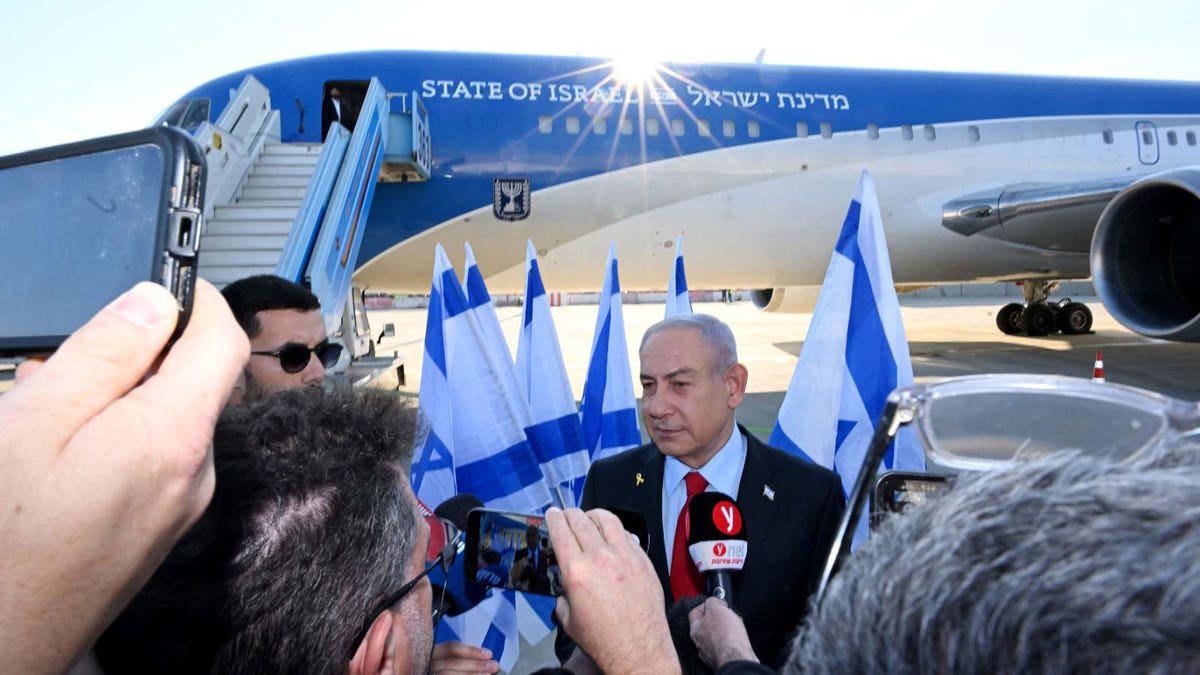
Benjamin Netanyahu told reporters ahead of his departure that it was «telling» Trump chose to meet him first. (Prime Minister’s Office)
«This meeting will deal with important issues, critical issues facing Israel and our region, victory over Hamas, achieving the release of all our hostages and dealing with the Iranian terror axis and all its components – an axis that threatens the peace of Israel, the Middle East and the entire world,» he said.
There are currently 79 hostages held by Hamas in Gaza, including six dual US-Israeli citizens. «Regarding agenda terms, Trump will want Netanyahu to proceed to the second phase of the truce agreement with Hamas. This is very difficult for Israel, since this basically leaves the terror group in power in Gaza,» former Israeli Ambassador to the U.S. Michael Oren told Fox News Digital.
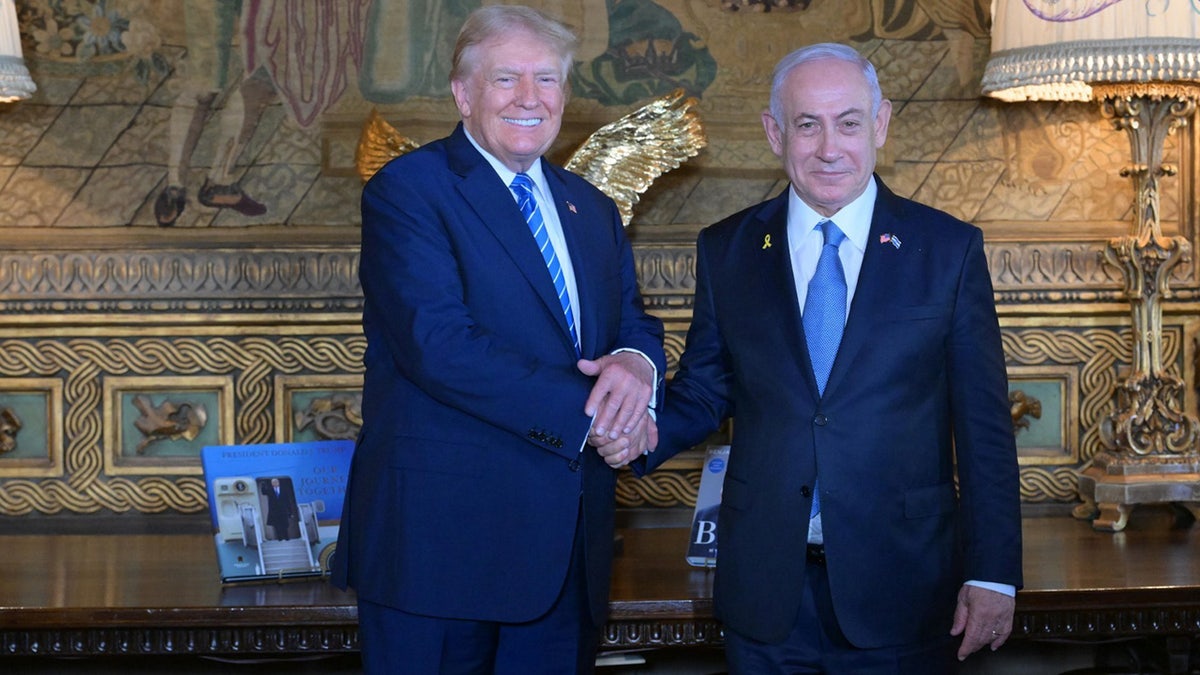
Former President Donald Trump shakes hands with Israeli Prime Minister Benjamin Netanyahu during their meeting at Mar-a-Lago estate, in Palm Beach, Florida, on July 26, 2024. (Amos Ben-Gershom (GPO)/Handout/Anadolu via Getty Images)
While Trump has said he was «not confident» the ceasefire deal would hold, his Mideast envoy Steve Witkoff visited Israel last week and reportedly pushed for the implementation of all three phases. According to Netanyahu, Trump has committed to supporting the resumption of the war if negotiations with Hamas prove «futile.»
«There may also be discussion about the future of the Palestinian issue and ways in which the Trump peace plan unveiled during his first term can be revived, as well as how a normalization push between Israel and Saudi Arabia can be concluded,» Oren said. «I think the major pressure point would be the ‘P’ word, which refers to the Saudis insisting on a pathway to Palestinian statehood. Parts of Netanyahu’s coalition and even some within his own party will not discuss the ‘P’ word.»
IRAN HIDING MISSILE, DRONE PROGRAMS UNDER GUISE OF COMMERCIAL FRONT TO EVADE SANCTIONS

The families of the four released hostages reunite with their daughters on Jan. 25, 2025. (IDF Spokesman’ Unit)
On this point, the two leaders may be aligned, with Trump insisting that Gaza be rebuilt «in a different way.» He also indicated his desire to relocate Gazans to Arab countries. «You’re talking about probably a million and a half people, and we just clean out [Gaza] and say, ‘You know, it’s over,’» he said.
During his first term, Trump pulled Washington out of the 2015 nuclear deal with Tehran, which was orchestrated by the Obama administration. However, the Biden administration undid most of Trump’s «maximum pressure» campaign on Tehran – consisting primarily of crippling sanctions – by rehashing many Obama-era policies.
«I believe that Trump is prepared to immediately snap back paralyzing sanctions and issue a credible military threat to bring Iran back to the negotiating table for an agreement on its nuclear infrastructure, ballistic missile testing and terror financing,» Danny Ayalon, former Israeli deputy foreign minister and ambassador to the U.S., told Fox News Digital.
«If not, the Iranians will be subject to a major operation that may be through an American-led coalition or different structures with or without Israel,» he added, while referencing an Axios report last month that the U.S. president might «either support an Israeli military strike against Iran’s nuclear facilities… or even order a U.S. strike.» However, Ayalon said Trump will express a preference for a diplomatic solution, possibly placing him at odds with Netanyahu.
BUSY WEEK AHEAD FOR TRUMP, CABINET PICKS

Hamas terrorists watch on as four hostages are released to the Red Cross as part of a ceasefire deal with Israel. (TPS-IL)
Ayalon also noted Netanyahu’s appreciation for Trump’s initiative to punish the International Criminal Court, which in November issued arrest warrants for the Israeli premier and then-Defense Minister Yoav Gallant over the prosecution of the war against Hamas, while suggesting that normalization between Jerusalem and Riyadh would be raised as part of a broader effort to reshape the Middle East.
«A potential economic corridor from Asia to Europe through Saudi Arabia, Israel, Jordan, maybe even the Palestinian Authority, works very well with Trump’s agenda of countering aggressive Chinese expansionism through the Belt and Road Initiative,» Ayalon said.
Other agenda items might include a possible U.S.-backed push to apply Israeli sovereignty over parts of the West Bank, also known by Israel as Judea and Samaria – a prospect Netanyahu shelved during Trump’s first term in favor of forging the Abraham Accords – and expanding overall defense ties, including by advancing the American president’s goal of developing an Iron Dome-like missile shield for the United States.
«It is very different from the Biden administration. Of course, it is more aggressive but that’s only part of it. Trump sees the problem of Gaza in a wider perspective» that includes the Saudis, Qataris, Egyptians and other regional players, Brig. Gen. (Res.) Hannan Gefen, the former commander of IDF’s elite Unit 8200, told Fox News Digital.
«Trump, in his second term, is repeating his willingness to withdraw from the Kurdish-controlled northeastern part of Syria, which may contrast with Israel’s interest,» he explained. «In Lebanon, there might be a disagreement if Israel sees Hezbollah [violating the ceasefire and] regaining power, and wants to strike terror bases. Regarding the Houthis in Yemen, Israel and the Saudis will try to direct Trump’s policy to be more assertive than Biden was toward the Iranian proxy.»
CLICK HERE TO GET THE FOX NEWS APP
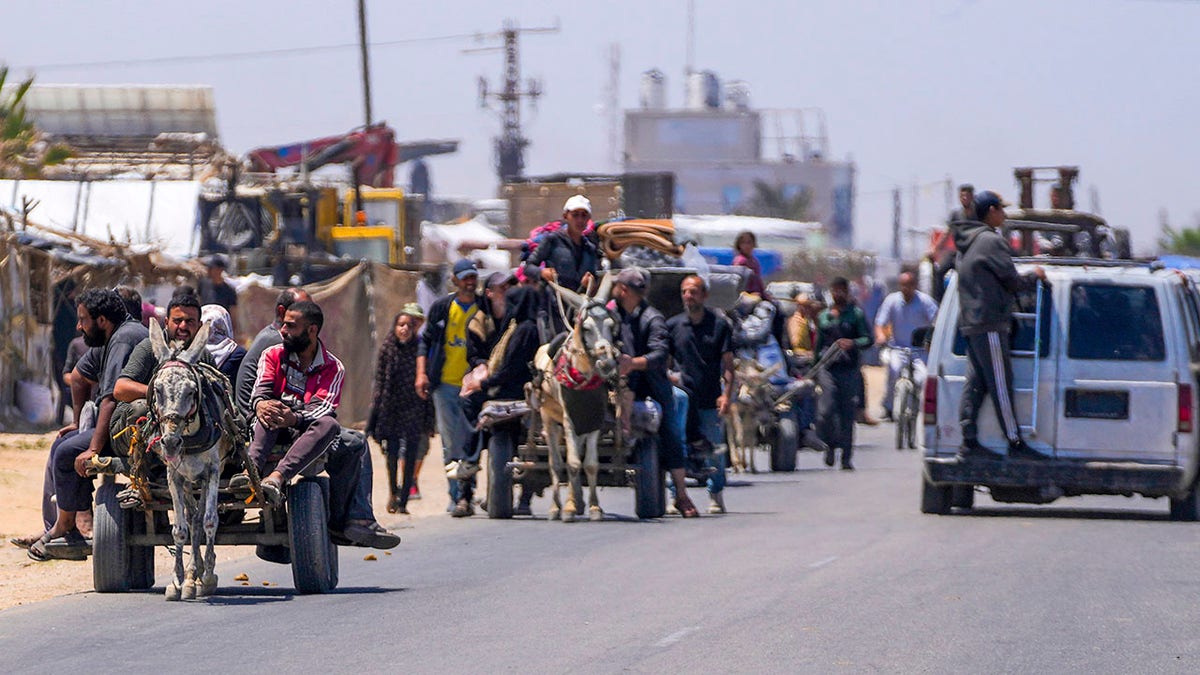
Displaced Palestinians arrive in central Gaza after fleeing from the southern city of Rafah on May 9. (AP/Abdel Kareem Hana)
While any gaps between the sides will be overshadowed by the pomp and circumstance accompanying a visit by Netanyahu to D.C., Likud lawmaker Boaz Bismuth told Fox News Digital that the prime minister «won’t make any concessions on issues that relate to Israel’s national security.
«Our national interests come above all else – the state has an obligation toward its civilians and the right to defend itself,» Bismuth said. «Fortunately, Trump has a thriving relationship with Israel and is a great friend of ours.»
-
POLITICA2 días ago
Denuncia judicial contra Axel Kicillof por la crisis de inseguridad en la provincia de Buenos Aires
-
SOCIEDAD2 días ago
Conurbano salvaje. Hallaron muertos debajo de un puente a dos adolescentes que habían desaparecido el jueves
-
POLITICA3 días ago
El Gobierno cruzó a Axel Kicillof por la inseguridad en la Provincia: “Este es el garantismo kirchnerista”
-
POLITICA19 horas ago
Guillermo Francos cargó contra Kicillof tras el doble crimen de Florencio Varela: «La Provincia está incendiada por la inseguridad»
-
POLITICA3 días ago
Un presidente a contramano que esta vez prefirió pisar el freno
-
ECONOMIA2 días ago
El método para empezar invertir si te faltan 10 años para jubilarte







